| Srl | Item |
| 1 |
ID:
105948
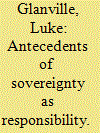

|
|
|
|
|
| Publication |
2011.
|
| Summary/Abstract |
Notions of 'sovereignty as responsibility' and 'the responsibility to protect' are often fra-med as radical departures from the 'traditional' conception of sovereignty. Many assume that sovereignty has, until recently, entailed only rights and not responsibilities. In con-trast, this article argues that sovereign authority has been understood to involve varied and evolving responsibilities since it was first articulated in the 16th and 17th centuries. It then traces the historical emergence of the tension between the right of sovereign states to be self-governing and free from outside interference and their responsibility to secure the safety of their populations. It cautions against a simplified story of 'traditional' sovereignty which reifies supposedly concrete and ahistorical rights of sovereigns while casting sovereign responsibilities as a morally abstract and late-arriving challenge.
|
|
|
|
|
|
|
|
|
|
|
|
|
|
|
|
| 2 |
ID:
145729
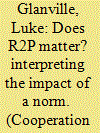

|
|
|
|
|
| Summary/Abstract |
There is a curious tendency among some scholars and commentators to denigrate the impact of the Responsibility to Protect (R2P). Drawing on constructivist scholarship that illuminates both the regulative and constitutive ways that norms matter and that explains how the effects of norms can be interpreted, I argue that the R2P norm has a real and observable impact on the behaviour of states. I demonstrate that this impact can be detected not only in instances of compliance, such as in Libya, but perhaps even more clearly in examples of violation, such as in Syria.
|
|
|
|
|
|
|
|
|
|
|
|
|
|
|
|
| 3 |
ID:
105718
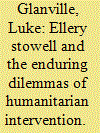

|
|
|
|
|
| Publication |
2011.
|
| Summary/Abstract |
Ellery Stowell's detailed study of humanitarian intervention, published in 1921, rewards a close reading today. In this article, I consider two broad themes of his work that continue to be of particular relevance. First, his discussion of the rightfulness of humanitarian intervention is grounded in a concept of responsible sovereignty which is remarkably similar to present-day notions of "sovereignty as responsibility" and "the responsibility to protect." I suggest that this points to an enduring intimate relationship between sovereignty and responsibility which both advocates and critics of intervention for the protection of populations today have a problematic tendency to either ignore or forget. Second, his argument that external actors possess not merely a right but an obligation to intervene to enforce the protection of populations has clear parallels with the present-day notion that the society of states bears a "responsibility to protect" populations. I observe that, while much has changed, advocates of "the responsibility to protect" continue to struggle to overcome some of the same dilemmas about the "imperfect" nature of this obligation that confronted Stowell.
|
|
|
|
|
|
|
|
|
|
|
|
|
|
|
|
| 4 |
ID:
123141
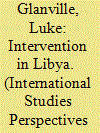

|
|
|
|
|
| Publication |
2013.
|
| Summary/Abstract |
The adoption of Resolution 1973 authorizing intervention in Libya represented the first time that the UN Security Council had authorized military intervention in a functioning and non-consenting sovereign state for the purpose of protecting civilians. A crucial factor prompting skeptical states to allow the passage of the resolution in the absence of sovereign consent was the fact that relevant regional organizations had consented to, indeed appealed for, such action. This article examines this possible shift away from reliance on sovereign consent and toward reliance on the consent of regional organizations in Security Council deliberations about the authorization of military intervention to protect civilians, and it considers what it might mean for the future of civilian protection.
|
|
|
|
|
|
|
|
|
|
|
|
|
|
|
|
| 5 |
ID:
119642
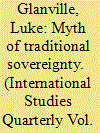

|
|
|
|
|
| Publication |
2013.
|
| Summary/Abstract |
The conventional story of sovereignty told in the discipline of International Relations (IR) tells us that there is a "traditional" or "Westphalian" meaning of sovereignty that has prevailed since the seventeenth century and that accords states the right to govern themselves free from outside interference. In recent years, the tale goes, this meaning has been challenged for the first time by notions of conditional and responsible sovereignty. This article argues that the supposed "traditional" meaning of sovereignty is not as foundational and timeless as is often assumed. Rather than a right of non-intervention, it was the right to wage (just) war that was first conceived by political theorists to be the external corollary of the internal supremacy of the sovereign. This included the right of war to punish tyranny and rescue the oppressed. This article examines the initial absence and then the gradual emergence of the "traditional" meaning of sovereignty, arguing that it was only firmly established by international society for the first time in the twentieth century. It concludes by considering some of the implications of this revised story of sovereignty for the study of IR.
|
|
|
|
|
|
|
|
|
|
|
|
|
|
|
|
| 6 |
ID:
074352
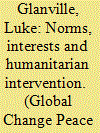

|
|
|
|
|
| Publication |
2006.
|
| Summary/Abstract |
A number of constructivist and English school scholars have investigated the extent to which humanitarian intervention is allowed and legitimized by international society. In other words, they have examined the nature and strength of a norm permitting humanitarian intervention. It is the contention of this article that another norm of humanitarian intervention-parallel but discrete-has been neglected. It is argued that ideas and beliefs shared by some members of international society not only permit intervention but prescribe it in certain circumstances and this has been largely ignored in the literature. By focusing on questions of when, where and why humanitarian action is permitted, scholars have neglected to develop theoretical explanations for the significant inconsistencies in humanitarian action that can be observed in the world. States do not intervene to prevent human rights violations simply because they are allowed to. By considering when and where humanitarian action is prescribed, and the interplay of this prescription with the self-interests of states, we can begin to understand why states respond to some grave violations of human rights and not others. The article concludes with an analysis of the power of the prescriptive norm to explain the increased instances of humanitarian intervention since the end of the Cold War and an assessment of the present state of the norm.
|
|
|
|
|
|
|
|
|
|
|
|
|
|
|
|
| 7 |
ID:
155496
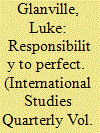

|
|
|
|
|
| Summary/Abstract |
Mounting evidence suggests that non-consensual military intervention is most often a poor instrument for alleviating mass suffering. Thus, a growing number of scholars and practitioners argue that the international toolbox for protecting populations should also contain non-coercive tools for assisting states and enhancing their capacities. But while studies of the history of military intervention proliferate, past thinking about duties of assistance and capacity-building remains relatively neglected. This article seeks to rectify this state of affairs by analyzing and seeking insights from the detailed treatment of non-coercive means of discharging duties to others offered by the eighteenth-century Swiss jurist and diplomat Emer de Vattel. Drawing on Leibniz’s conception of “perfection,” Vattel argued that states have duties to contribute to the perfection of those beyond their borders insofar as they can without doing an “essential injury” to themselves. While some of his claims about duties may be uncontroversial today, others remain subject to ongoing contestation, and still others have been forgotten and demand renewed attention. Crucially, while Vattel acknowledged the need for prudence, he also demanded that states be willing to make sacrifices for the sake of vulnerable strangers. He framed the cultivation of ever greater ability to assist others as a fundamental aspect of a state’s own self-perfection.
|
|
|
|
|
|
|
|
|
|
|
|
|
|
|
|